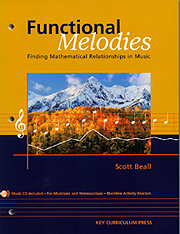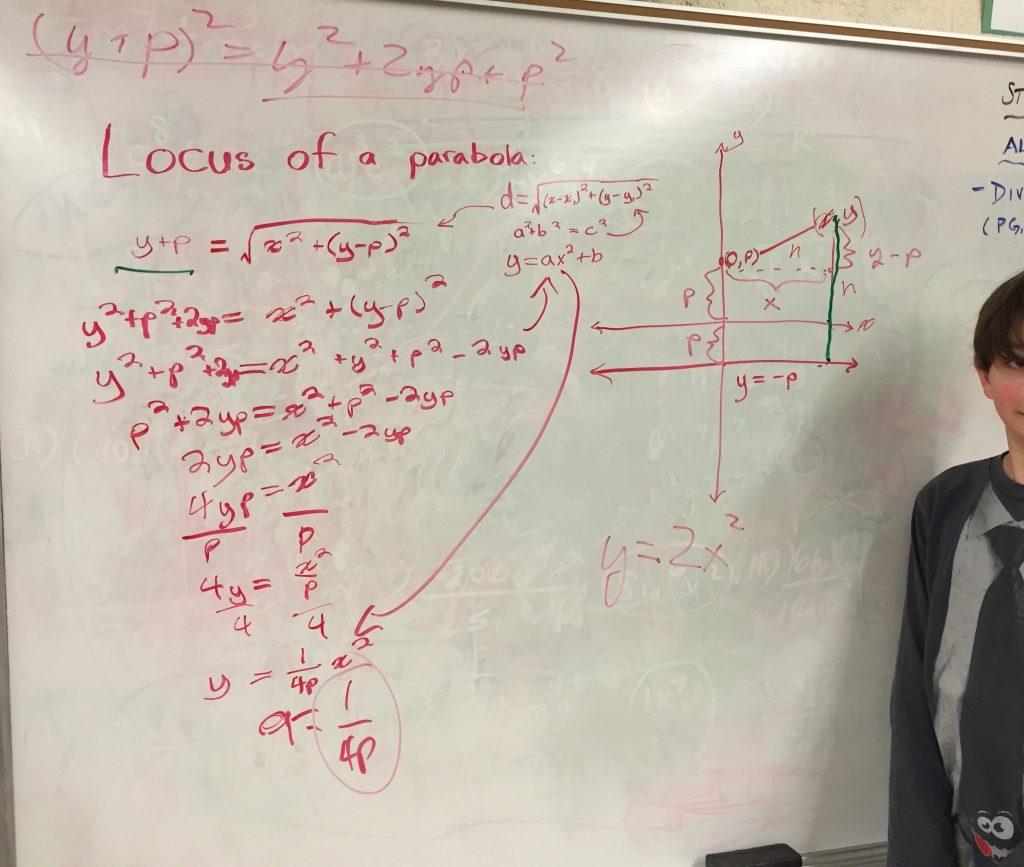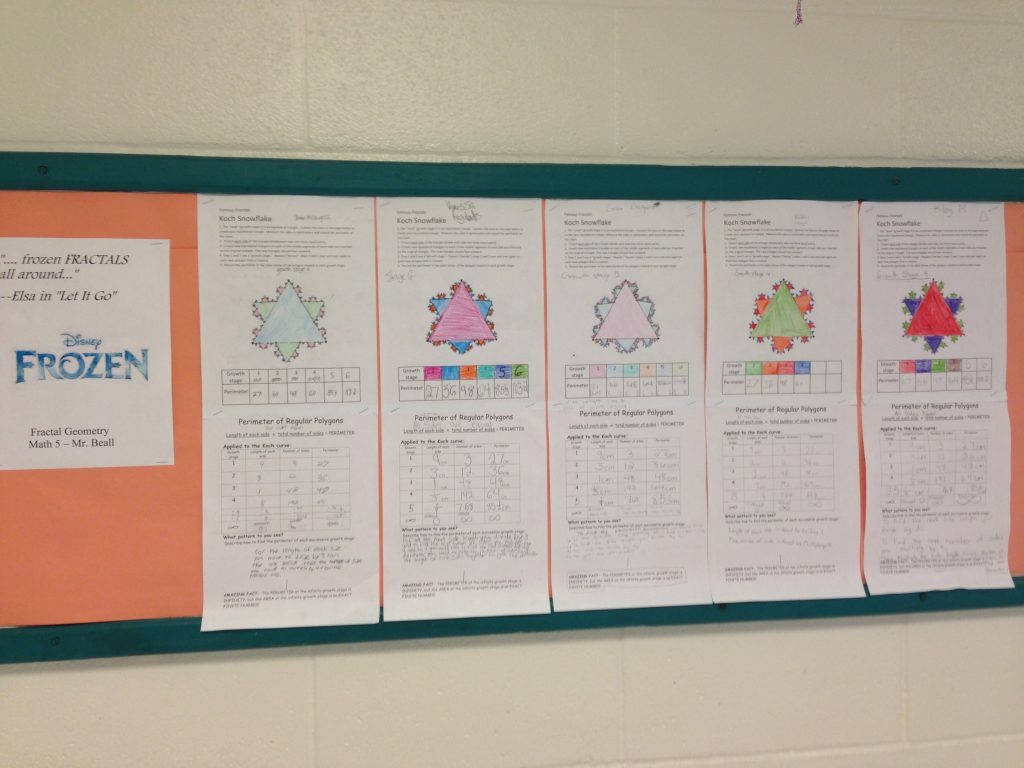Problem-Based Inquiry in Mathematics
Adaptable for Grades 6-11
In this course students choose, in consultation with Mr. Beall and parents, the most attractive and relevant set of problem inquiries to pursue based on students’ learning needs, interest and abilities. Problem-based learning mimics the real world process of mathematicians, scientists and engineers. In this approach learning begins with a key problem or question that launches an inquiry to develop and apply relevant mathematical tools to inform the problem or question. Accessing mathematics and learning this way not only enhances depth of understanding and retention of math skills, but is highly motivating and inspiring to students for the study of mathematics and builds creative problem solving abilities within the discipline.
It is important to emphasize that the goal and focus of this course is not only to maximize students’ knowledge and skill in standards based mathematics, but to involve students in the use of math as a critical thinking tool to inform highly relevant questions and issues in their world.
The inquiry areas offered fall in categories of sustainability, music, physics and engineering, and general pure mathematics as described below. A key element of this approach is to allow the learning to be driven by the student hence the time spent on any inquiry can be highly variable, driven by further questions that emerge or need for reteaching or skill building required for individual students to address the problem. A single inquiry might expect to span 2-7 class sessions.
Sustainability
1. The End of Oil: When will all the oil reserves of planet earth be consumed? How important is it for society to transition to renewable fuels? How are projections made? What is the value of math as a source of truth? Math topics: Geometric series and sum formula, scientific notation, exponential functions and equations, solving multi-step equations.
2. Ocean Fisheries: What dynamics and parameters are in play for sustainable ocean fisheries? What economic decisions and geopolitical implications are inherent in managing ocean fisheries? What does civilization need to pay most attention to in order to preserve the future of ocean fisheries? Math topics: Solving multi-step equations, creating math models, estimation.
3. Global Population and the Ecological Footprint: What is an ecological footprint and when will humanity reach carrying capacity on Earth? What can be done to reduce per capita ecological footprints? What is the relationship between standard of living, population, land area, and a nation’s ecological footprint? Math topics: Proportions and ratios, scientific notation, creating function models, solving multi-step equations.
4. Thermal solar energy technology design (Concentrated solar energy): What are the physical principles in play in solar thermal electricity generation and how can a collector be designed? (In this problem the student will create the mathematics to design a solar thermal collector). Math topics: Analytic geometry, distance formula, locus definition of a parabola, solving quadratic equations.
5. Energy Audit – Mathematics of energy consumption: How can any facility, a home, business, school, etc. reduce its energy consumption, lower its footprint and reduce cost of operation?. Math topics: Unit conversions, units of energy, rates, setting up equations, solving multi-step equations.
Music
6. Music composition and theory: Can music be composed using mathematical functions? Will such music sound “good?” What is the role of mathematics in aesthetics? Where is the boundary between art and mathematical thinking in the process of music? (This inquiry is project based, involving the student in creating their own original music composition using mathematical functions and the MuseScore software.). Math topics: Coordinate graphing, definition of a function, function transformations and their graphs, order of operations, range and domain.
7. Physics of sound–scale temperament: Is the musical scale a creation of technology, a man made tuning, or is it inherent in nature? How are guitars and pianos tuned and designed? What is the history of this development? What are the musical issues associated with this topic? Math topics: exponential functions, ratios, fraction multiplication, solving exponential functions.
8. The Mathematics of Polyrhythms: What are polyrhythms? What is the mathematical basis of complexity in music from various cultures? Math topics: how to determine a least common multiple, ratios, grouping, patterns,
9. Record Producer Algebra: How do music programmers use Algebraic thinking to program music? How does the use of mathematics make life easier? Math topics: Counting, multiple representations, solving algebraic equations.
Physics and Engineering
10. Make a Pendulum Wave Machine: What factors determine the frequency of a pendulum swing? What is simple harmonic motion and how does it connect music, math and pendulums? What is a pendulum wave machine, what does it demonstrate and how can it be constructed? Math/physics topics: frequency, frequency formula for a pendulum, solving algebraic equations, order of operations.
11. Golden Gate Bridge Suspension Cables: How are the lengths of suspension cables on a suspension bridge calculated? How long are the cables of the Golden Gate Bridge in San Francisco, CA? (In this inquiry the actual plans of the Golden Gate Bridge are used as a resource to perform the calculations). Math topics: Equations for parabolic graphs and circles, manipulating algebraic formulas, calculation.
12. Design a “Brise Soleil”: What is a Brise Soleil? What factors must be considered in its design? How and why does it work? Why is it important? (A Brise Soleil is an architectural retrofit for windows in a building to reduce heat retention and provide cooling, reducing energy consumption.). Math topics: similar triangles, proportions, trigonometry
13. Time dilation: What are some of the discoveries that made Albert Einstein famous? What is the theory of relativity? What is the relationship between time, mass and velocity for any object? Can that be measured and calculated? How do we know it is true? Math topics: transforming algebraic formulas, evaluating expressions, solving algebraic equations.
General
14. Fibonacci numbers and the Golden Section Rectangle: What is the Fibonacci number sequence, the golden section rectangle and how are they related? Where have they shown up in history and in art and music? Math topics: solving quadratic equations, proportions, ratios.
15. Fractal Geometry-The Koch Snowflake: What are fractals and why are they useful? How does one create a generalized formula from a pattern? How can an infinite series equal a finite number? Math topics: perimeter, area, iteration, generalizing pattens in sequences.
16. Special Problems in Logic and Strategy: This category emphasizes logic, creative problem solving, ingenuity, and perseverance in an assortment of often open ended problems that include Corey The Camel, Checkerboard Squares, Bobo and the Train, The Commuter Train, Its All Gone and more. Math topics: creative problem solving, calculation, multiple representations, strategy development.
17. Student designed problem project: Original problem on research on existing classical math problem. This might include finding mathematical underpinnings of any area of interest, as well as career research. Math topics: variable.
Pedagogy of Problem-Based Inquiry in Mathematics
Inquiry process – The concept of “authentic inquiry” refers to a natural, organic way of learning much akin to how humans learn as toddlers–asking questions and exploring for answers. In these inquiries the questions provide a launching point for investigations with the teacher acting as facilitator and guide. Each student’s learning in a particular inquiry is unique, shaped by their personality and curiosity, and in all cases leading them to engage and learn new mathematics in response to their inquiry.
Student learning – This type of learning mimics the real life practices of mathematicians and scientists. Through this work students gain an enhanced sense of confidence, relevance, wonder, agency, and appreciation, not just for the study of mathematics, but for the overall process of learning. Additionally, the process strengthens students’ depth of understanding of math concepts and facility with a wide range of mathematical skills.





